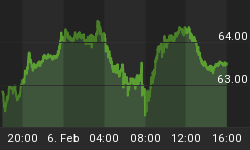The panic we suggested would occur in our report last month has enveloped the credit markets.
"When the house of (credit) cards begins to fall in on itself, the trend turns from inflation to deflation. That's when creditors turn their focus from lending to collecting and debtors turn their focus from borrowing to repaying. But by this time there are too many IOUs, and debtors cannot service them, much less repay them. Falling asset values and economic contraction thwart efforts to honor the loans. Debtors begin to default. When that happens, the game is up." - Bob Prechter, Elliot Wave Theorist
With the default of the Carlyle Group fund, buyout/bankruptcy of Bear Stearns and forced selling of mortgages by UBS; the game of the last sixty years is up. U.S. home prices are down roughly 12% since the top registered last July, consumer confidence has fallen to the lowest level in 35 years, and banks are hoarding cash as regulators prepare for a surge in failures. Commodity markets including the precious metals have recently experienced vicious reversals. Even "cash-like" securities are losing value. With the mortgage bond market acting like the stock market of 1929, the enablers of credit are experiencing a margin call of epic proportions. As in the 1930s, the Fed is failing against market forces. Finally the financial media is reporting the severity of the crisis:
"The problem is that vital markets that most people never see - the constant borrowing and lending and trading among huge institutions - have been paralyzed by losses, fear, and uncertainty. And you can't get rid of losses, fear, and uncertainty by cutting rates."
Bank Deposits
"Real-estate loans, not failed stockbrokers' accounts, were the largest single element in the failure of 4,800 banks in the years from 1930 to 1933." Homer Hoyt. One Hundred Years of Land Values in Chicago.
We are expecting a large number of bank failures as conditions deteriorate:
"At times like these, also, it becomes clear that bank deposits are not really money- even on a paper, let alone a gold standard- but mere money-substitutes, which serve as money ordinarily, but reveal their true identity when nationwide confidence begins to collapse." Murray Rothbard, America's Great Depression.
While bank deposits up to $100k are insured, the FDIC is under no time restraint to pay depositors back. Similarly, many hedge funds have halted withdrawals "tying up tens of billions of dollars for an indefinite period." Due to FDIC backlogs, we expect that bank depositors will not have access to their cash when it is time to benefit from bargain prices.

Looking Back To May
In last year's report titled "May 10th - Credit Collapse," we provided a description of the credit crunch of 1837. We return to the year 1837 once again, specifically to Chicago, where easy credit had induced a real estate bubble. Homer Hoyt in One Hundred Years of Land Values in Chicago describes the impact of the credit collapse:
"Under these conditions it soon became impossible to borrow money on real estate or to renew existing loans...Still there was no distress sales and no drastic declines in land values. In 1838 business improved temporarily and the Illinois banks, after a suspension of thirteen months, resumed specie payments on August 13, 1838. Only 17,640 acres were sold (436,992 acres in 1836) by the Chicago land office in 1838, however, and very few sales were made in Chicago itself. Another financial crisis swept through the country in the autumn of 1839...That real estate values had declined drastically could no longer be concealed by 1839. The extent of the decline was revealed when the government insisted on selling..."
William B. Ogden, a resident of Chicago, reveals the extent of the decline in a November 1839 letter preserved by the Chicago Historical Society:
"One fourth of 1836 prices can hardly be obtained for much business property at this time and one 10th to a 20th is about all town property will bring or is worth compared to sales of 1836."
What's Next?
While we should expect rocket-launched (oh, they've saved us!) bear market rallies, eventually Wall Street Firms will run into more troubles. Investors holding securities in margin accounts at troubled firms will find that at best they will not have access to funds, at worst they will learn new words like 'rehypothecation' and 'arbitrament.' If you have a friend or relative with funds at these institutions, alert them of their precarious position.
They're Selling, Mortimer - Why, That's Ridiculous!
At Lamont Trading Advisors, we provide wealth preservation strategies for our clients. For more information, contact us. Our monthly Investment Analysis Report requires a subscription fee of $40 a month. Current subscribers are allowed to freely distribute this report with proper attribution.
***No graph, chart, formula or other device offered can in and of itself be used to make trading decisions.















